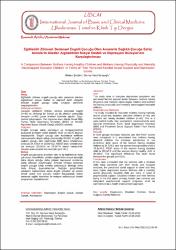| dc.contributor.author | Şentürk, Meltem | |
| dc.contributor.author | Saraçoğlu, Gamze Varol | |
| dc.date.accessioned | 2017-08-02T08:03:44Z | |
| dc.date.available | 2017-08-02T08:03:44Z | |
| dc.date.issued | 2013 | |
| dc.identifier.uri | https://hdl.handle.net/20.500.11776/2198 | |
| dc.description.abstract | Amaç Eğitilebilir zihinsel engelli çocuğu olan annelerin aileden algıladıkları sosyal destek ve depresif belirti düzeyini zihinsel engelli çocuğa sahip olmayan annelerle karşılaştırmaktır. Materyal ve Metod Çalışma, eğitilebilir zihinsel ve/veya bedensel engelli (n=40) ve herhangi bir fiziksel ya da zihinsel yetersizliği olmayan (n=40) çocuk anneleri üzerinde yapıldı. Olgukontrol çalışmasıdır. Veri toplama aracı olarak Genel Bilgi Formu, Beck Depresyon Envanteri (BDE) ve Aileden Algılanan Sosyal Destek Ölçeği (ASDÖ) kullanıldı. Bulgular Engelli çocuğa sahip olan(olgu) ve olmayan(kontrol) gruplarda annelerin evlilik ilişkileri, BDE ve ASDÖ skorları karşılaştırıldı. Engelli çocuğu olan kadınlarda evlilikten memnuniyetin düşük olduğu belirlendi(p<0,001). Engelli ve sağlam çocuğu olan kadınlarda BDE skoru ortalamaları sırasıyla 24,7±9,8 ve 18,8±10,2; ASDÖ skoru ortalamaları ise sırasıyla 20,6±9,0 ve 28,0±7,9 olarak hesaplandı. Gruplar arası anlamlı fark bulundu (p<0,001). Sonuç Engelli çocuğa sahip annelerin aile ve eş ilişkilerinde daha çok sorun hissettikleri, aileden algıladıkları sosyal desteğin daha düşük olduğu, daha yüksek depresyon skorlarına sahip oldukları bulunmuştur. Zihinsel ve/veya bedensel engelli çocuğa sahip anneler psikososyal desteğe daha fazla ihtiyaç duymaktadırlar. Sağlığın geliştirilmesi yaklaşımı kapsamında başta engelli çocuklar ve aileleri olmak üzere tüm çocuklu aileleri kapsayacak birinci basamak sağlık hizmetleri ile entegre psikososyal destek programları başlatılmalıdır. | en_US |
| dc.description.abstract | Aim This study aims to compare depressive symptoms and perceived familial support levels between mothers having physically and mentally handicapped children and mothers not having physically and mentally handicapped educable children. Materials and Methods The study included 80 volunteer mothers having mentally and/or physically disabled educable children (n=40) and mothers not having disabled children (n=40). This is a case-control study. Our assessment measurements were General Information Form, Beck Depression Inventory (BDI) and Perceived Social Support Taken From Family (PSSF). Results In both groups marriage relations and BDI-PSSF scores were compared. It is ascertained that mothers having disabled children the marriage satisfaction is low (p<0.001). BDE score of the women having disabled children is 24.7±9.8, and the women having healthy child is 18.8±10.2; PSSF score of the women having disabled child is 28.0±7.9 and the women having healthy child is 20.6±9.0. The significant difference has been found between the groups (p<0.001). Conclusion It has been concluded that the mothers with a disabled child have problems with their family and husband relations, the perceived social support is lower and they have higher depression scores. Mothers with a mentally and/or physically disabled child are more in need of psychosocial support. Disabled children and their families being in the first place, primary health care services and integrated psychosocial support programs must be commenced as a health improvement approach. | en_US |
| dc.language.iso | tur | en_US |
| dc.publisher | Namık Kemal Üniversitesi, Tıp Fakültesi | en_US |
| dc.rights | info:eu-repo/semantics/openAccess | en_US |
| dc.subject | Depresyon | en_US |
| dc.subject | Engelli Çocuk | en_US |
| dc.subject | Sosyal Destek | en_US |
| dc.subject | Aile ilişkileri | en_US |
| dc.subject | Depression | en_US |
| dc.subject | Disabled Children | en_US |
| dc.subject | Social Support | en_US |
| dc.subject | Family Relations | en_US |
| dc.title | Eğitilebilir Zihinsel, Bedensel Engelli Çocuğu Olan Annelerle Sağlıklı Çocuğa Sahip Annelerin Aileden Algıladıkları Sosyal Destek ve Depresyon Düzeylerinin Karşılaştırılması | en_US |
| dc.title.alternative | A Comparison Between Mothers Having Healthy Children and Mothers Having Physically and Mentally Handicapped Educable Children in Terms of Their Perceived Familial Social Support and Depression Levels | en_US |
| dc.type | article | en_US |
| dc.relation.ispartof | Namık Kemal Tıp Dergisi (International Journal of Basic and Clinical Medicine) | en_US |
| dc.department | Fakülteler, Tıp Fakültesi, Dahili Tıp Bilimleri Bölümü | en_US |
| dc.authorid | 48342 | en_US |
| dc.identifier.volume | 1 | en_US |
| dc.identifier.issue | 1 | en_US |
| dc.identifier.startpage | 40 | en_US |
| dc.identifier.endpage | 49 | en_US |
| dc.relation.publicationcategory | Makale - Ulusal Hakemli Dergi - Kurum Öğretim Elemanı | en_US |



















